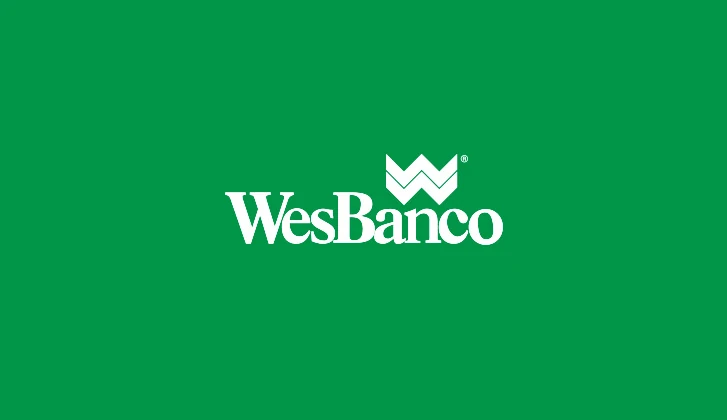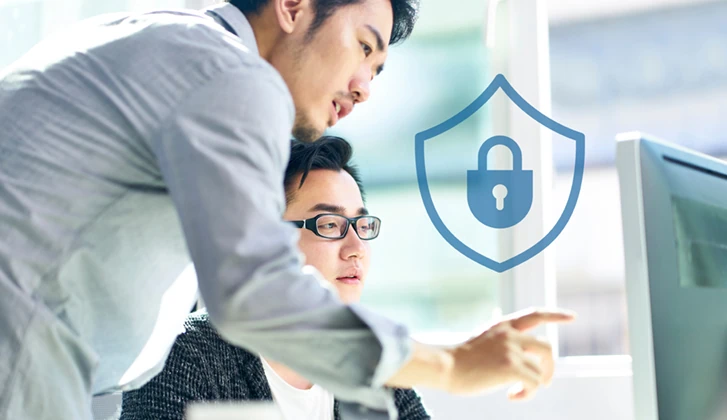NOTICE: Internet Explorer was retired by Microsoft on June 15th, 2022 and is no longer supported. This could change how you access Online Banking.
Our banking centers close at 12pm on 12/24 through Christmas Day. Transactions scheduled at that time will be processed the next business day.
Online Banking Security | Banking Cybersecurity

How to Enhance Your Online Banking Security
Digital banking is the new normal. The convenience of accessing your bank account from almost anywhere to making mobile deposits from your mobile device and having the ability to pay bills online is just more convenient. But, with convenience comes the importance of online banking security.
However, as essential as your mobile devices are to the way you live, using them can expose you to serious problems if you’re not following some basic banking security rules. WesBanco’s security team works hard to offer the most secure banking practices for our customers. Just visit our Security Center to learn more about cybersecurity efforts and different steps you can take to protect your digitial devices.
Help protect yourself and your information with these online banking security tips.
Is Online Banking Safe?
You might be asking yourself – Is online banking safe? Online banking is generally very safe when secure technology from financial institutions is combined with security efforts by the users.
To stop hackers, thieves and others who’d love to benefit by accessing your personal and financial information, you can establish a line of defense by using tools and best practices of online banking safety.
- Ensure your devices have up-to-date anti-virus software
- Be sure to use secure networks
- Create strong passwords
- Use a two-factor authentication method
- Download a virtual private network (VPN)
- Avoid phishing attacks
- Sign up for text alerts
Protect Your Personal Information
The first line of defense against cyber threats is never sharing personal information online, whether it’s a credit card or bank account number, your address and phone number or other personal information.
Sharing confidential information like this, especially on social media, can be used to steal your data. The more you share about yourself on social media the easier it is for someone to access your personal information.
Install Antivirus Software
It’s important to make sure your devices have up-to-date antivirus software to protect you from malware and provide a safe online banking environment. Viruses are actually not the real problem—it’s thieves after your money and your data. At the very least, make sure that you’ve installed free antivirus protection from a reputable provider, and that you run the software’s updates when they are available.
For most people, though, it’s worth the money to subscribe to security software. Look for products that protect against spyware, which mines your personal information, and ransomware, which encrypts your files so that they’re inaccessible until you pay money to restore access. You can learn more about the top-rated providers at ConsumerReports.org or PCMag.com.
Consider Using Virtual Private Networks
You may want to go even further to protect your online activity and download a virtual private network (VPN). If you work from home, you may already be using a corporate VPN that links you to your employer’s server. Provided you’re careful to log out when you’re finished, the connection is secure. When you have a VPN service, your data is encrypted by the software, and then is sent through the VPN server before it goes to your online destination. That means it’s extremely difficult to trace that data back to you.
VPN security may be important if you frequently connect to the internet using public Wi-Fi networks, which are notoriously vulnerable to hackers. They also provide greater protection against having your data or personal information sold.
Choosing the right VPN can be a little overwhelming. But there are a few practical guidelines that can help in your search. Choose a provider that’s been around for a while, has a good track record and offers a money-back guarantee. Most importantly, keep in mind why you want a VPN: to protect your privacy. So, choose a VPN that doesn’t track your internet traffic or sell your data to third parties, which many free VPN services do. It also helps to choose a service with a user-friendly, simple interface and that offers good customer service, preferably with a 24/7 live chat option.
Public Wi-Fi networks are notoriously vulnerable to hackers.
Update Your Password Protection
Another critical component to safe online banking is using strong, unique passwords for each site you’re registered on, especially for sites that provide access to your personal, financial or other confidential information. If your password is too obvious, it will provide no protection at all. And don’t make the mistake of using the same password over and over. Once an online thief cracks one account, the next step is to try that password for every single account connected with your email address.
To keep multiple accounts secure, you might want to try a password manager. Password managers create complex passwords for your accounts, encrypt them, store them in a vault, and access the one you need to log in to your account. These managers can also protect other digital information, like credit card numbers and PINs. There may be a small annual fee for the service.
Guard Against Phishing Attacks
Phishing happens when scammers act as a reputable company, such as a bank, to obtain an individual’s confidential information. Phishing attacks can happen through an email, phone call and even text messages. This practice is widespread and increasingly sophisticated. The best protection is to not open any attachments or click on any links that you don’t know for sure are legitimate.
In addition to suspicious attachments and links, there are some other telltale signs that an email is a scam, including the use of incorrect company names or URLs, poor spelling and grammar, and a generic greeting rather than your name. Another tip-off is when emails contain urgent calls to action, such as a threat that an account will be cancelled or a bill sent to a collection agency.
Remember: WesBanco will never ask you to send personal or financial information by, in response to, or via a link in an email or social media posting. If you think you’ve been a victim of a phishing attempt or identify fraud, contact WesBanco immediately.
Here’s how to easily spot phishing scams.
Be Careful Buying Online
While it’s completely commonplace to make purchases on your computer or phone, your financial cyber security can still be compromised without some basic preventative measures. You’ll want to look for the security padlock symbol in the URL bar, to the left of the company’s name. To make sure it’s legitimate, click on it to make sure it takes you to a site security certificate. You should also double-check that the URL begins with “HTTPS,” which means the data you send and receive from the site is encrypted.
When it comes to purchasing products on social media or from an app with unclear security standards, go the extra step to set up a PayPal account or something similar. When using a product like PayPal to make purchases, the purchase order is encrypted, so the seller has no access to your account number or direct access to your account. Just make sure that when you use PayPal or something like it, your security software is up to date. And as always, avoid making financial transactions using public Wi-Fi like from a local coffee shop or hotel.
Content is for informational purposes only and is not intended to provide legal or financial advice. The views and opinions expressed do not necessarily represent the views and opinions of WesBanco.
While we hope you find this content useful, it is only intended to serve as a starting point. Your next step is to speak with a qualified, licensed professional who can provide advice tailored to your individual circumstances. Nothing in this article, nor in any associated resources, should be construed as financial or legal advice. Furthermore, while we have made good faith efforts to ensure that the information presented was correct as of the date the content was prepared, we are unable to guarantee that it remains accurate today.
Neither Banzai nor its sponsoring partners make any warranties or representations as to the accuracy, applicability, completeness, or suitability for any particular purpose of the information contained herein. Banzai and its sponsoring partners expressly disclaim any liability arising from the use or misuse of these materials and, by visiting this site, you agree to release Banzai and its sponsoring partners from any such liability. Do not rely upon the information provided in this content when making decisions regarding financial or legal matters without first consulting with a qualified, licensed professional.
Explore WesBanco Insights
Discover how WesBanco can help you prepare for the road ahead. Gain exclusive insights and learn how to achieve your financial goals.
Education & Insights



